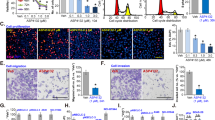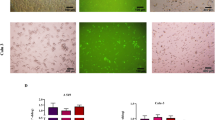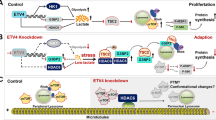Abstract
Aim:
To investigate the role of LKB1 in regulation of mTOR signaling in non-small cell lung cancer (NSCLC) cells.
Methods:
LKB1 protein expression and phosphorylation of AMPK, 4E-BP1 and S6K in the cells were assessed using Western blotting in various NSCLC cell lines (A549, H460, H1792, Calu-1 and H1299). Energy stress was mimicked by treating the cells with 2-deoxyglucose (2-DG). Compound C was used to inhibit AMPK activity. Cell growth was measured using the MTS assay.
Results:
LKB1 protein was expressed in LKB1 wild-type Calu-1, H1299 and H1792 cells, but it was undetected in LKB1 mutant A549 and H460 cells. Treatment of the LKB1 wild-type cells with 2-DG (5, 10 and 25 mmol/L) augmented the phosphorylation of AMPK in dose- and time-dependent manners. In the LKB1 wild-type cells, 2-DG dramatically suppressed the phosphorylation of two mTOR targets, 4E-BP1 and S6K, whereas the LKB1 mutant A549 and H460 cells were highly resistant to 2-DG-induced inhibition on mTOR activity. In addition, stable knockdown of LKB1 in H1299 cells impaired 2-DG-induced inhibition on mTOR activity. Pretreatment of H1299 and H1792 cells with the AMPK inhibitor compound C (10 μmol/L) blocked 2-DG-induced inhibition on mTOR activity. 2-DG inhibited the growth of H1299 cells more effectively than that of H460 cells; stable knockdown of LKB1 in H1299 cells attenuated the growth inhibition caused by 2-DG.
Conclusion:
In non-small cell lung cancer cells, LKB1/AMPK signaling negatively regulates mTOR activity and contributes to cell growth inhibition in response to energy stress.
Similar content being viewed by others
Log in or create a free account to read this content
Gain free access to this article, as well as selected content from this journal and more on nature.com
or
References
Hemminki A, Markie D, Tomlinson I, Avizienyte E, Roth S, Loukola A, et al. A serine/threonine kinase gene defective in Peutz-Jeghers syndrome. Nature 1998; 391: 184–7.
Giardiello FM, Brensinger JD, Tersmette AC, Goodman SN, Petersen GM, Booker SV, et al. Very high risk of cancer in familial Peutz-Jeghers syndrome. Gastroenterology 2000; 119: 1447–53.
Lim W, Hearle N, Shah B, Murday V, Hodgson SV, Lucassenet A, et al. Further observations on LKB1/STK11 status and cancer risk in Peutz-Jeghers syndrome. Br J Cancer 2003; 89: 308–13.
Sanchez-Cespedes M, Parrella P, Esteller M, Nomoto S, Trink B, Engles JM, et al. Inactivation of LKB1/STK11 is a common event in adenocarcinomas of the lung. Cancer Res 2002; 62: 3659–62.
Matsumoto S, Iwakawa R, Takahash K, Kohno T, Nakanishi Y, Matsuno Y, et al. Prevalence and specificity of LKB1 genetic alteration in lung cancer. Oncogene 2007; 26: 1–8.
Zhong DS, Guo LZ, de Aguirre I, Liu XJ, Lamb N, Sun SY, et al. LKB1 mutation in large cell carcinoma of the lung. Lung Cancer 2006; 53: 285–94.
Marcus AI, Zhou W . LKB1 regulated pathways in lung cancer invasion and metastasis. J Thorac Oncol 2010; 5: 1883–6.
Zhang X, Sun L, Zhong D . Advances of LKB1-AMPK-mTOR signaling pathway in tumor. Zhongguo Fei Ai Za Zhi 2011; 14: 685–8.
Gao Y, Ge G, Ji H . LKB1 in lung cancerigenesis: a serine/threonine kinase as tumor suppressor. Protein Cell 2011; 2: 99–107.
Herrmann JL, Byekova Y, Elmets CA, Athar M . Liver kinase B1 (LKB1) in the pathogenesis of epithelial cancers. Cancer Lett 2011; 306: 1–9.
Brown J . Effects of 2-deoxyglucose on carbohydrate metabolism: review of the literature and studies in the rat. Metabolism 1962; 11: 1098–112.
Pelicano H, Martin DS, Xu RH, Huang P . Glycolysis inhibition for anticancer treatment. Oncogene 2006; 25: 4633–46.
Shaw RJ . Glucose metabolism and cancer. Curr Opin Cell Biol 2006; 18: 598–608.
Weindruch R, Keenan KP, Carney JM, Fernandes G, Feuers RJ, Floyd RA, et al. Caloric restriction mimetics: metabolic interventions. J Gerontol A Biol Sci Med Sci 2001; 56: 20–33.
Hawley SA, Boudeau J, Reid JL, Mustard KJ, Udd L, Mäkelä TP, et al. Complexes between the LKB1 tumor suppressor, STRAD alpha/beta and MO25 alpha/beta are upstream kinases in the AMP-activated protein kinase cascade. J Biol 2003; 2: 28.
Woods A, Johnstone SR, Dickerson K, Leiper FC, Fryer LG, Neumann D, et al. LKB1 is the upstream kinase in the AMP-activated protein kinase cascade. Curr Biol 2003; 13: 2004–8.
Inoki K, Zhu T, Guan KL . TSC2 mediates cellular energy response to control cell growth and survival. Cell 2003; 115: 577–90.
Corradetti MN, Inoki K, Bardeesy N, DePinho RA, Guan KL . Regulation of the TSC pathway by LKB1: evidence of a molecular link between tuberous sclerosis complex and Peutz-Jeghers syndrome. Genes Dev 2004; 18: 1533–8.
Shaw RJ, Bardeesy N, Manning BD, Lopez L, Kosmatka M, DePinho RA, et al. The LKB1 tumor suppressor negatively regulates mTOR signaling. Cancer Cell 2004; 6: 91–9.
Sun LL, Zhong DS, Wu S, Bai H, Chen Z . Establishment and gene expression profiling of LKB1 stable knockdown lung cancer cell line. Chin Med J 2011; 124: 2028–32.
Swinnen JV, Beckers A, Brusselmans K, Organe S, Segers J, Timmermans L, et al. Mimicry of a cellular low energy status blocks tumor cell anabolism and suppresses the malignant phenotype. Cancer Res 2005; 65: 2441–8.
J Carretero, PP Medina, R Blanco, L Smit, M Tang, G Roncador, et al. Dysfunctional AMPK activity, signalling through mTOR and survival in response to energetic stress in LKB1-deficient lung cancer. Oncogene 2007; 26: 1616–25.
Acknowledgements
The project was supported by grants from the National Natural Science Foundation of China (No 30971307 and No 81071915) and the Tianjin Natural Science Foundation (No 10JCYBJC13700).
Author information
Authors and Affiliations
Corresponding author
Rights and permissions
About this article
Cite this article
Dong, Lx., Sun, Ll., Zhang, X. et al. Negative regulation of mTOR activity by LKB1-AMPK signaling in non-small cell lung cancer cells. Acta Pharmacol Sin 34, 314–318 (2013). https://doi.org/10.1038/aps.2012.143
Received:
Accepted:
Published:
Issue date:
DOI: https://doi.org/10.1038/aps.2012.143



